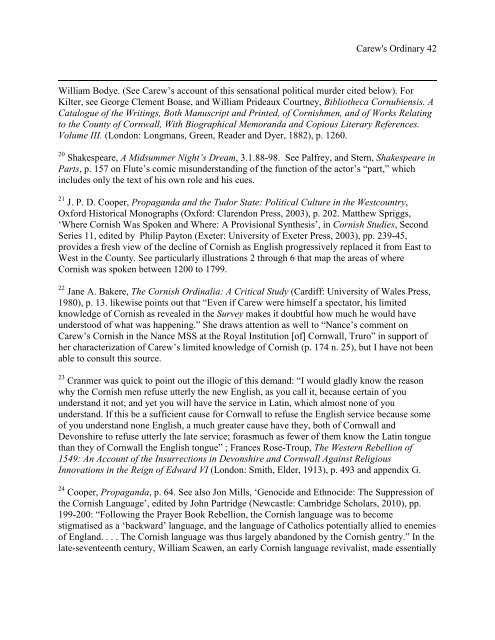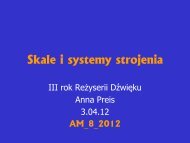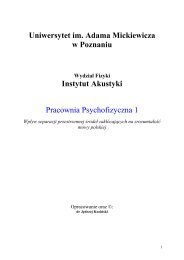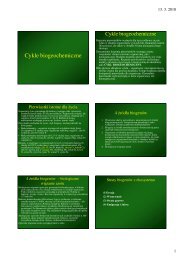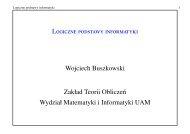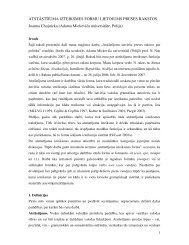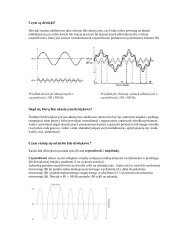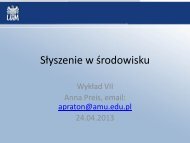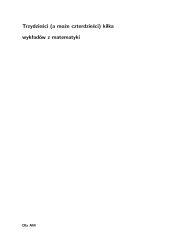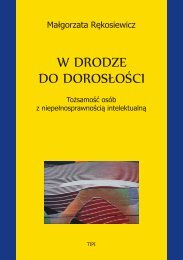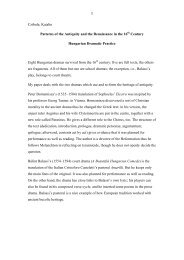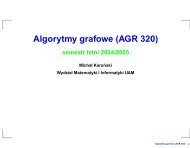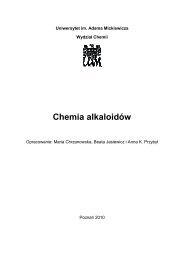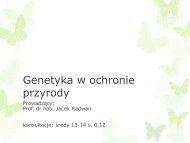Richard Carew. The Ordinary, The Ordinalia, and the Ordinary Actor ...
Richard Carew. The Ordinary, The Ordinalia, and the Ordinary Actor ...
Richard Carew. The Ordinary, The Ordinalia, and the Ordinary Actor ...
You also want an ePaper? Increase the reach of your titles
YUMPU automatically turns print PDFs into web optimized ePapers that Google loves.
<strong>Carew</strong>'s <strong>Ordinary</strong> 42<br />
William Bodye. (See <strong>Carew</strong>’s account of this sensational political murder cited below). For<br />
Kilter, see George Clement Boase, <strong>and</strong> William Prideaux Courtney, Biblio<strong>the</strong>ca Cornubiensis. A<br />
Catalogue of <strong>the</strong> Writings, Both Manuscript <strong>and</strong> Printed, of Cornishmen, <strong>and</strong> of Works Relating<br />
to <strong>the</strong> County of Cornwall, With Biographical Memor<strong>and</strong>a <strong>and</strong> Copious Literary References.<br />
Volume III. (London: Longmans, Green, Reader <strong>and</strong> Dyer, 1882), p. 1260.<br />
20 Shakespeare, A Midsummer Night’s Dream, 3.1.88-98. See Palfrey, <strong>and</strong> Stern, Shakespeare in<br />
Parts, p. 157 on Flute’s comic misunderst<strong>and</strong>ing of <strong>the</strong> function of <strong>the</strong> actor’s “part,” which<br />
includes only <strong>the</strong> text of his own role <strong>and</strong> his cues.<br />
21 J. P. D. Cooper, Propag<strong>and</strong>a <strong>and</strong> <strong>the</strong> Tudor State: Political Culture in <strong>the</strong> Westcountry,<br />
Oxford Historical Monographs (Oxford: Clarendon Press, 2003), p. 202. Mat<strong>the</strong>w Spriggs,<br />
‘Where Cornish Was Spoken <strong>and</strong> Where: A Provisional Syn<strong>the</strong>sis’, in Cornish Studies, Second<br />
Series 11, edited by Philip Payton (Exeter: University of Exeter Press, 2003), pp. 239-45,<br />
provides a fresh view of <strong>the</strong> decline of Cornish as English progressively replaced it from East to<br />
West in <strong>the</strong> County. See particularly illustrations 2 through 6 that map <strong>the</strong> areas of where<br />
Cornish was spoken between 1200 to 1799.<br />
22 Jane A. Bakere, <strong>The</strong> Cornish <strong>Ordinalia</strong>: A Critical Study (Cardiff: University of Wales Press,<br />
1980), p. 13. likewise points out that “Even if <strong>Carew</strong> were himself a spectator, his limited<br />
knowledge of Cornish as revealed in <strong>the</strong> Survey makes it doubtful how much he would have<br />
understood of what was happening.” She draws attention as well to “Nance’s comment on<br />
<strong>Carew</strong>’s Cornish in <strong>the</strong> Nance MSS at <strong>the</strong> Royal Institution [of] Cornwall, Truro” in support of<br />
her characterization of <strong>Carew</strong>’s limited knowledge of Cornish (p. 174 n. 25), but I have not been<br />
able to consult this source.<br />
23 Cranmer was quick to point out <strong>the</strong> illogic of this dem<strong>and</strong>: “I would gladly know <strong>the</strong> reason<br />
why <strong>the</strong> Cornish men refuse utterly <strong>the</strong> new English, as you call it, because certain of you<br />
underst<strong>and</strong> it not; <strong>and</strong> yet you will have <strong>the</strong> service in Latin, which almost none of you<br />
underst<strong>and</strong>. If this be a sufficient cause for Cornwall to refuse <strong>the</strong> English service because some<br />
of you underst<strong>and</strong> none English, a much greater cause have <strong>the</strong>y, both of Cornwall <strong>and</strong><br />
Devonshire to refuse utterly <strong>the</strong> late service; forasmuch as fewer of <strong>the</strong>m know <strong>the</strong> Latin tongue<br />
than <strong>the</strong>y of Cornwall <strong>the</strong> English tongue” ; Frances Rose-Troup, <strong>The</strong> Western Rebellion of<br />
1549: An Account of <strong>the</strong> Insurrections in Devonshire <strong>and</strong> Cornwall Against Religious<br />
Innovations in <strong>the</strong> Reign of Edward VI (London: Smith, Elder, 1913), p. 493 <strong>and</strong> appendix G.<br />
24 Cooper, Propag<strong>and</strong>a, p. 64. See also Jon Mills, ‘Genocide <strong>and</strong> Ethnocide: <strong>The</strong> Suppression of<br />
<strong>the</strong> Cornish Language’, edited by John Partridge (Newcastle: Cambridge Scholars, 2010), pp.<br />
199-200: “Following <strong>the</strong> Prayer Book Rebellion, <strong>the</strong> Cornish language was to become<br />
stigmatised as a ‘backward’ language, <strong>and</strong> <strong>the</strong> language of Catholics potentially allied to enemies<br />
of Engl<strong>and</strong>. . . . <strong>The</strong> Cornish language was thus largely ab<strong>and</strong>oned by <strong>the</strong> Cornish gentry.” In <strong>the</strong><br />
late-seventeenth century, William Scawen, an early Cornish language revivalist, made essentially


